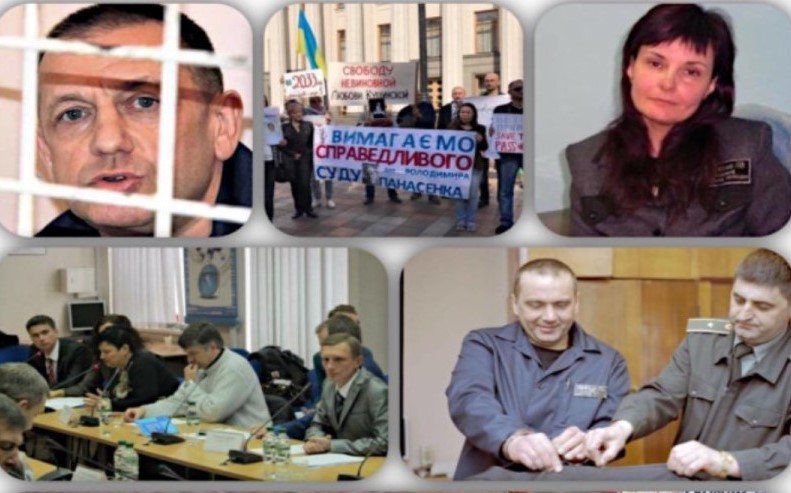Vital chance for justice after Ukrainian Constitutional Court ruling

Ukraine’s Constitutional Court has found the current system depriving life prisoners of any chance of release to be unconstitutional. The move is in keeping with European Court of Human Rights judgements, and is particularly important since there is currently no legal mechanism in Ukraine for reviewing cases where the life sentence was very likely a miscarriage of justice.
The judgement is long and complicated, but essentially finds two articles of the Criminal Code (Articles 81 § 1 and 82 § 1 to be unconstitutional “in that they make it impossible to apply them in the case of people sentenced to life imprisonment”. The Court has obliged Ukraine’s Verkhovna Rada to bring the two articles of the Criminal Code into keeping with its judgement. Constitutional Court judgements are not subject to appeal, so something really does now need to be done.
This judgement is at least two years late. On 12 March 2019, in the case of Petukhov v. Ukraine, , the European Court of Human Rights [ECHR] found that Ukraine was in violation of several rights protected by the European Convention. It held unanimously that there had been a violation of Article 3 (the prohibition of torture) specifically on account of Petukhov’s irreducible life sentence. The Court pointed to a systematic problem regarding life prisoners and even set out a solution. “For the proper execution of the present judgment the respondent State would be required to put in place a reform of the system of review of whole-life sentences. The mechanism of such a review should guarantee the examination in every particular case of whether continued detention is justified on legitimate penological grounds and should enable whole-life prisoners to foresee, with some degree of precision, what they must do to be considered for release and under what conditions, in accordance with the standards developed in the Court’s case-law.”
This was ignored, as was the Court’s Factsheet from January 2020 which clearly stipulated that Article 3 requires at least the possibility that a life sentence can be reduced, ECHR was careful to stress that they are not saying that all prisoners must eventually be released, but such a mechanism much exist.
On 10 December 2020, ECHR published the Case of Lopata and Others v. Ukraine which reiterated that Ukraine was in violation of the prohibition of torture, and did so in bulk. The 24 applicants included Volodymyr Panasenko, who has spent 16 years in prison for a crime nobody believes that he committed.
Panasenko was represented in Strasbourg by lawyer Vadim Chovhan. Following the Constitutional Court [CCU] judgement on 16 September 2021, Chovhan explained how the judgement had come about. In 2017, when it became possible for individuals to directly apply to CCU, he and Tetyana Panasenko (a fellow lawyer and Volodymyr Panasenko’s daughter) “successfully lost” a district court suit and its appeal, with the lost cases required in order to take the issue to the Constitutional Court.
Their application to CCU specifically challenged the lack of any possibility of release in the Criminal Code. The Court, however, refused to initiate proceedings, with the formal pretext, Chovhan explains, being that you can’t challenge what does not exist.
Chovhan’s response was brilliant. He posted instructions on the Kharkiv Human Rights Group website on how to challenge life sentences at the Constitutional Court, providing all the necessary procedural documents. He circulated the instructions as widely as possible in the hope that there would be a wave of such applications – and there was.
He believes there were several dozen applications, all of them probably copy-pasted from his original. In the vast majority of cases, they too were turned down, but not all, and we now have the result in the 16 September 2021 CCU Judgement.
More is, undoubtedly, needed, but this is a start. Ukraine’s Constitutional Court finally declared the death penalty unconstitutional in the year 2000. This was a hugely important step forward, but it did lead to life sentences being handed out far too liberally, including in cases where courts now would probably sentence somebody to 15 years. Since a life sentence at present is really for life, a person is only likely to be released if terminally ill. In theory, there is the possibility of a presidential pardon, yet Oleksandr Pavlichenko, Executive Director of the Ukrainian Helsinki Human Rights Union and member of the Commissions on Pardons, recently spelled out the failings of the current system. These include the fact that the Commission invariably rejects applications from life prisoners on the grounds of the gravity of the crime they are supposed to have committed.
The problem is not merely that people were sentenced to life who would not be now. Until a new Criminal Procedure Code was introduced in 2012, there were no mechanisms for ensuring that a person could not be convicted and sentenced, even to life, on the basis of ‘confessions’, tortured out of a person, testimony given without a lawyer being present, etc. There are a very large number of cases where there are legitimate grounds for believing that a person is serving life for a crime he did not commit, or that the sentence was excessive.
Under the presidency of Viktor Yanukovych, a huge number of powers were taken away from the Supreme Court, including its right to review criminal cases under extraordinary procedure. Such procedure had enabled review of a conviction in cases where there had been violations of material or procedural law, for example, where evidence had been fabricated or falsified. Ukraine’s legislators have had plenty of time to rectify the situation but have not done so. Volodymyr Panasenko has now spent over 15 years imprisoned for a crime he did not commit, and he is not alone.
See: Ukraine’s most malicious miscarriages of justice
Zelensky fails crucial test for restoring justice in Ukraine





